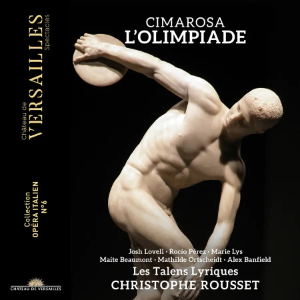
Domenico Cimarosa (1749-1801)
L’Olimpiade (1784)
Josh Lovell (tenor), Clistene; Rocío Pérez (soprano), Aristea; Mathilde Ortscheidt (soprano), Licida; Maite Beaumont (soprano), Megacle; Marie Lys (soprano), Argene; Alex Banfield (tenor), Aminta; Les Talens Lyriques/Christophe Rousset (pianoforte et direction)
rec. 2023, Salle Colonne, Paris
Sung texts with French, English and German translations enclosed
Reviewed as a WAV 44-16 download
Château de Versailles CVS143 [2 CDs: 145]
The timing of this issue is certainly perfect, with the Olympic Games coming up at the end of July and some events scheduled to take place in the gardens of the Château de Versailles. The idea of reviving the ancient games was still more than 150 years away when Metastasio wrote the original libretto in 1733 for Antonio Caldara, but the story tempted lots of composers during the following decades. Vivaldi and Pergolesi were the first ones and up till 1817, when Donizetti began but never completed his version, at least 53 composers had set Metastasio’s libretto. The texts were modified to suite each new composer, but the basic story remained. In all likelihood, this means that this must be one of the most frequently set librettos in the history of opera. Most educated people were familiar with the historic background through paintings and statues, and some of those are reproduced in the comprehensive booklet, together with deep-probing essays. The story in itself is hugely complicated, as we of course expect from operas from this period and involves a lot of cheating; that, of course, still goes on, but the methods have become more sophisticated. However, there is a happy ending.
The music is melodious, but harmonically conventional. Structurally it follows the pattern of the Neapolitan opera, with secco recitatives alternating with arias, but Cimarosa shuns da capo arias in favour of more varied and flexible melodies that are well adjusted to the texts, and sometimes simple cavatinas of great beauty, but many of his arias are virtuoso pieces that require high technical skills, fluent coloratura. His orchestration is also flexible and active. The recitatives are expressive, and they are often condensed into accompagnato with full orchestra. There are also a duo and a couple of ensembles. Once or twice there are long orchestral intros, and woodwind solos occasionally share the limelight with a singer. All in all, this is a varied score that fizzes along without longueurs – all highly entertaining. It is remarkable that this is a premiere recording.
The singing is also on a high level. With four sopranos in the cast, it is at times difficult to distinguish amongst who is who – but the libretto is a help. The tenors are very distinctively different. Josh Lovell (Clistene) is a brilliant dramatic singer, while Alex Banfield (Aminta) is super-lyrical. Of the ladies Marie Lys’ Argene is possibly the star, with her rounded, mezzo-like tone, but the others are equally admirable. Rocío Péres (Aristea) has a somewhat metallic tone but is impressively dramatic and has a stratospheric top notes. Both Mathilde Ortscheidt (Licida) and Maite Beaumont (Megacle), in roles originally composed for castratos. are mightily impressive. With Christophe Rousset at the helm of his Les Talens Lyriques, we are in the safest possible hands in this repertoire.
Il matrimonio segreto is still Cimarosa’s masterwork, and I would advise readers to search out Barenboim’s DG recording (review) – available as download only – first of all, but L’Olympiade is in its own right a worthy addition to the Cimarosa discography.
Göran Forsling
If you purchase this recording using a link below, it generates revenue for MWI and helps us maintain free access to the site




















